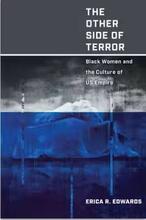
Erica R. Edwards’ The Other Side of Terror: Black Women and the Culture of U.S. Empire exemplifies and advances the very best of American Studies interdisciplinarity by offering at once a stunningly original analysis of US counterinsurgent power and a new way of reading Black women’s expressive culture. Edwards contributes unprecedented insights into the operation of American global power, its inextricable relationship to the repression of Black radicalism within the United States, and Black feminist insurgent care and survival against it. In beautifully written and compelling prose, Edwards brilliantly illuminates Black women’s refraction of and confrontation with what she calls the long war on terror, the linked campaigns of counterterrorism at home and abroad stretching from 1968 to 2012 and including COINTELPRO, the war on drugs, and the intensification of the global security state after 9/11. Examining the political projects and literary productions of writers including June Jordan, Toni Cade Bambara, Gloria Naylor, Alice Randall, and Nikki Finney, Edwards renders an extraordinary explication of state power through the lens of black feminist radicalism by rigorously tracking what she aptly terms “state power at its most devious and most absurd.”
In a deeply researched and lucidly argued exploration of the relationship between anti-Black terror and late Cold War and post-Cold war counterinsurgency, Edwards analyzes what she terms imperial grammars of Blackness, persuasively showing how the national security state’s language of security depended on exceptional Black women to negotiate relationships between militarism and humanitarianism to produce a narrative of Black loyalty to the country. In unpacking the codes of cultural production and public discourse linking the rationalization of US imperial violence abroad to the US public sphere’s manipulation and incorporation of Blackness as the sign of multicultural beneficence, Edwards persuasively and eloquently advances an original analysis that makes a signal contribution to studies of state power in multiple related fields.
At the same time, Edwards offers a compelling and indispensable frame for reading and thinking about black cultural production. The Other Side of Terror fundamentally shifts our understanding of how Black feminist organizing and writing tracked changes in racial gendered power and transformed African American literature and Black studies while also offering new modes of resistance and survival aimed at collective preservation or the reconstitution of a collectivity. In The Other Side of Terror, Edward’s has lucidly pulled multiple methodological and field threads within American Studies into an elegant and forceful rethinking of profoundly urgent issues.
Read more here.